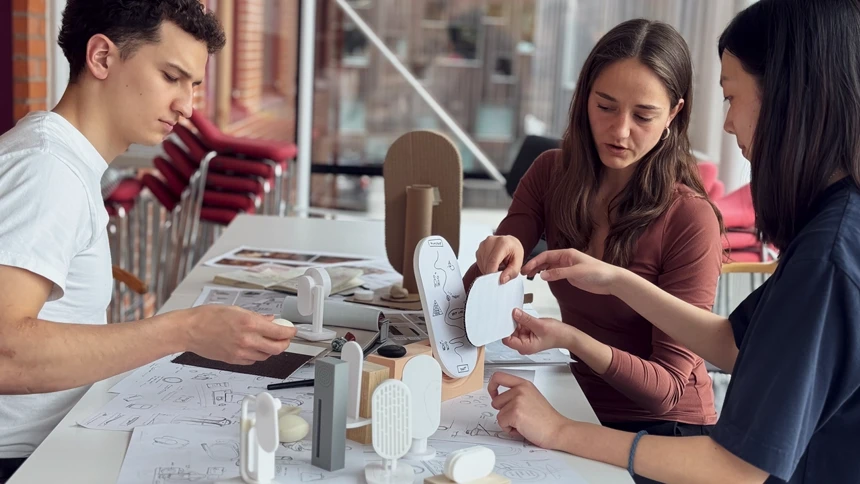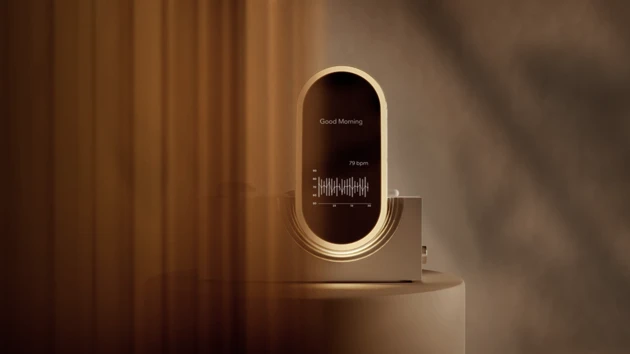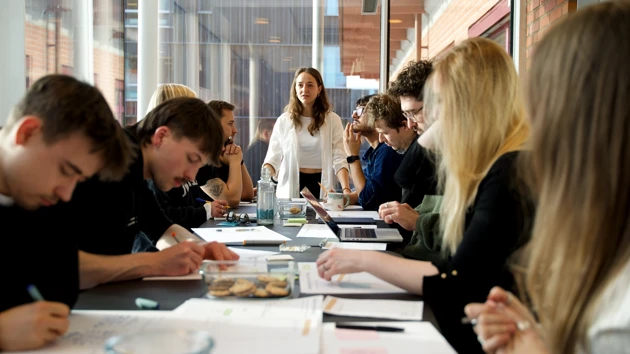Aveo is a smart wellness companion designed to support individuals on their journey from pain and confusion to relief and clarity.
From surviving to thriving: A young designer’s holistic approach to health
When Corinna Diestel speaks about healing, she does so with the quiet conviction of someone who has lived through the questions she now seeks to answer. “I have experienced going through chronic health conditions on multiple levels,” she says. “When you're at the point that doctors can no longer help you, you are left feeling uncertain.” That uncertainty became the seed of her master’s thesis at Umeå Institute of Design, where she is graduating from the MFA Advanced Product Design programme.

At the heart of Corinnas project lies the intention to unlock the full potential of health and wellbeing by bridging ancient wisdom with modern science.
Image:Jens PerssonHer project, Aveo, is not just a product. It is a deeply personal response to a healthcare system that often treats symptoms rather than people. It is also a bold proposal for a future in which healing is not something done to us, but something we learn to do for ourselves.
Hear Corinna Diestel, graduate from MFA Advanced Product Design, speak about her design concept Aveo.
A new language for wellness
At its core, Aveo is a smart wellness companion that blends traditional wisdom with cutting-edge technology. It offers guided therapeutic experiences using light, sound, breathwork, and meditation, all tailored to the user’s needs through intelligent biofeedback. The system senses brainwaves and physiological signals, then responds with personalised guidance to help users shift their internal state and understand how each practice supports their wellbeing.

But Aveo is more than a tool. It is a philosophy. “At the heart of my project lies the intention to bridge ancient wisdom and practices like meditation and breathwork with modern technologies like biofeedback and sound and light therapy,” Corinna explains. “It’s about creating something non-invasive and self-empowering.”
From pain to purpose
Corinna’s journey to Aveo began not in a studio, but in her own life. Like many who have experienced chronic illness, she is familiar with the stress connected to navigating a maze of treatments, appointments, and unanswered questions. The experience left her not only physically drained, but emotionally impacted. “Throughout this project, I felt I had to really find my audience and empathise with them,” she says. “How can I make such a complex concept easy to understand and tangible?”

Corinna conducting an ideation workshop to explore how technology might inform our senses to guide the user during the practices and increase motivation.
That question guided her design process. She conducted interviews with users and experts, studied scientific literature, and explored wellness technologies during a field trip to Stockholm. The result is a product that feels both futuristic and grounded, clinical yet comforting. Its soft, elegant design invites trust. Its modularity allows for personalisation. And its intelligence lies not in replacing the user’s intuition, but in helping them rediscover it.
A systemic shift
What sets Aveo apart is its holistic approach. Unlike fragmented health tools that address one symptom or one aspect of well-being, Aveo offers an integrated system. It provides structure, clarity, and tools for long-term transformation. It is designed not just for individuals, but for a healthcare landscape in need of reinvention.
As healthcare systems around the world strain under rising demand, Aveo offers a vision of care that is preventative, accessible, and rooted in self-awareness. It is relevant not only to those living with chronic health conditions, but also to healthcare professionals and designers shaping the future of wellness.
A future rooted in self-trust
In a world where medical solutions often come in the form of prescriptions and procedures, Aveo dares to ask a different question: what if healing begins with listening? What if the body, given the right tools and support, already knows the way?
For Corinna Diestel, this is not just a design challenge. It is a calling. Her work invites us to imagine a future where we are not passive recipients of care, but active participants in our own healing. A future where, as she puts it, we move “from confusion to clarity, from helplessness to self-trust, from surviving to thriving.”
And perhaps, in that future, we will all learn to hear what our bodies have been trying to tell us all along.
